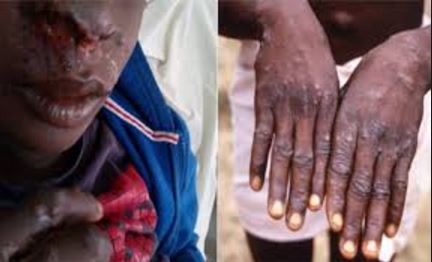It is important we talk about Monkey pox today to create more awareness on prevention because it is heart breaking to know that Monkey pox has spread to more states including Lagos, Ogun, Ekiti, Akwa Ibom, Rivers and Cross Rivers with over 30 (31) cases of the virus reported. There was an initial rumour that the outbreak was as a result of free medical care by in Bayelsa before the rumour was later debunked by The Federal Government saying that no free medical service took place in Bayelsa or Rivers state. Earlier in the week, Lagos state commissioner, Jide Idris spoke about two suspected cases being investigated saying there was no confirmed case recorded at the time except for the two suspected cases recorded in a private hospital where one of the suspected cases was said to have arrived from Bayelsa state claiming to have eaten bush meat.
Fam! Monkey Pox is a virus that belongs to the same family as Chicken Pox and Smallpox. It was first discovered in Africa in 1958 when two outbreaks of a pox-like disease occurred in colonies of monkeys kept for research, hence the name “monkey pox.” Then, the first recorded human case of monkeypox in Nigeria came in 1971 and later in 1976 when there were 2 cases respectively. The current outbreak in Nigeria is of West African origin.” It is suspected that someone may have contacted it by eating monkey meat, thus triggering the current outbreak,” the Minister said.
There could be Human-to-human transmission through direct physical contact with Clothing/Beddings of an Infected Person leading to indirect transmission. Basically, the virus can be found on materials like clothes and bed sheets even when the person has removed them or isn’t lying down on the sheets. It could be contracted through direct contact with an infected animal’s blood, body fluids or sores as well as by a bite. Several species of mammals can be infected with monkeypox,
Signs And Symptoms
Signs of illness start about 12 days after exposure while you would start seeing symptoms like fever, headache, muscle aches, backache, chills, sore throat, swollen glands (lymph nodes), and fatigue. Usually within 1 to 3 days, a rash with raised bumps develops, on the arms and legs and possibly the face and torso. Later, these sores develop into blister-like lesions containing pus. In the final stages, these sores crust over, form scabs, and eventually fall off. Illness generally lasts 2 to 4 weeks and most people recover fully
PREVENTION
These are four out of a few measures to be taken in preventing infection with monkeypox virus
Avoid eating bush meat for now if you can: It’s saddening some bush meat sellers will be experiencing reduction in sales at the moment. Health is more important fam! Be sure to cook your meat well. Take caution in whatever bush meat you eat. In some parts of Nigeria, rodents are consumed as ‘bush-meat’ Eating rodents during a monkey pox outbreak can increase the likelihood of contracting the disease.
Avoid Total Contact with animals that could harbour the virus: Sick animals like Infected Monkeys, Infected Rodents, in areas where Monkeypox occurs should be avoided except you are a vet doctor who uses personal protective equipment when caring for patients. Do not even go close to the bedding that has been in contact with a sick animal. Monkeypox is a viral disease transmitted from wild animals to humans; therefore avoid affected animals
Practice good hand hygiene after contact with infected animals or humans: Always wash your hands with soap and water or use an alcohol-based hand sanitizer after contact with animals or when caring for sick relatives
Do Not Self-Medicate But maintain a high index of suspicion
There are no specific treatments or vaccines available for monkeypox infection, but outbreaks can be controlled. Vaccination against smallpox has been proven to be 85% effective in preventing monkeypox in the past. All you need is be at alert and report suspected cases to your Local Government Area if you notice any of those symptoms in your pets – Contact your veterinarian immediately. In Humans – Contact your physician immediately. No cause for panic. Be calm. Avoid self-medication. It’s no time to shake everyone all over the place.
Further information can be obtained from NCDC toll-free number: 0800–970000–10; SMS: 08099555577 WhatsApp: 07087110839. Twitter/Facebook: @NCDCgov



